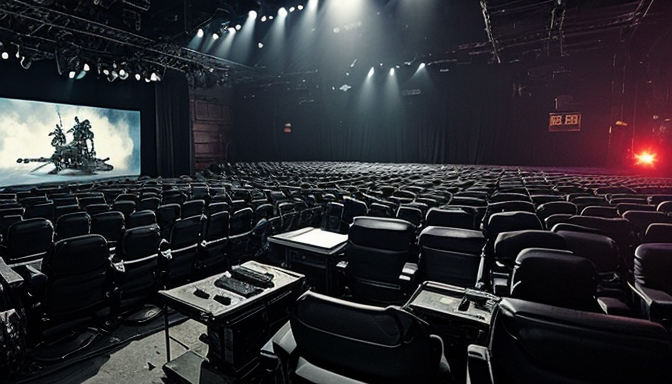In the glitzy world of entertainment, not every endeavor hits the mark. From blockbuster films that flop at the box office to concerts that leave fans scratching their heads, the industry is riddled with epic fails. But what exactly goes wrong? Often, it’s a combination of factors that leads to a spectacular downfall. For instance, consider the highly anticipated movie that, despite a star-studded cast and a hefty budget, fails to resonate with audiences. Was it the script? The direction? Or perhaps the marketing strategy missed the target completely?
One glaring example is the infamous “Cats” movie adaptation, which was met with ridicule rather than applause. Critics panned the visual effects, and audiences were left bewildered by the bizarre execution. The lessons here are clear: a great concept doesn’t guarantee success, and sometimes, the execution can be a fatal flaw.
Moreover, the entertainment landscape is constantly evolving, and what worked yesterday might not work today. The rise of social media means that a single misstep can go viral, amplifying the failure beyond what anyone could have imagined. So, whether it’s a concert that suffers from poor sound quality or a festival that fails to deliver on its promises, the common thread remains: adaptability is key. In a world where trends shift like quicksand, staying relevant is more crucial than ever.
Ultimately, these failures serve as a stark reminder that in the realm of entertainment, even the most promising projects can fall flat if they don’t align with audience expectations. Now, let’s dive deeper into the common factors that contribute to these missteps.
Common Factors in Entertainment Failures
When we think about epic fails in the entertainment industry, it’s easy to point fingers and say, “What were they thinking?” But the truth is, there are several common factors that lead to these spectacular missteps. From poor planning to a lack of audience engagement, the reasons can be as varied as the entertainment forms themselves. For instance, many concerts and festivals fail to resonate with audiences because they overlook the importance of targeted marketing. It’s not just about booking big names; it’s about knowing your audience, their preferences, and what truly excites them.
Another recurring theme is the failure to adapt. We live in a fast-paced world where trends change overnight. When entertainment entities cling to outdated formulas, they risk losing their audience. Remember that blockbuster movie that flopped despite a massive budget? Often, it’s because the creators didn’t recognize the shift in viewer expectations. They failed to innovate, and as a result, they missed the mark.
Moreover, poor execution can derail even the most well-intentioned projects. Whether it’s a theatrical production that lacks proper staging or a music festival plagued by logistical nightmares, the devil is in the details. A well-planned event can turn into chaos if the execution falters. This brings us to the importance of team collaboration. Without a cohesive effort from all parties involved, even the best ideas can fall flat.
In summary, understanding these common pitfalls can be the key to avoiding future disasters in the entertainment industry. By paying attention to audience needs, adapting to changes, and ensuring flawless execution, we can hopefully witness fewer entertainment fails in the future.

Lessons Learned from Epic Fails
When we dive into the realm of entertainment, it’s like stepping into a vibrant carnival—full of excitement, but sometimes, it can also be a chaotic mess. Epic fails in this industry serve as a mirror reflecting the missteps that can occur, and believe me, the lessons learned are invaluable. One of the most significant takeaways is the necessity of adaptability. Just think about it: when a concert flops due to poor weather, artists who can pivot and engage with their audience in creative ways often salvage their reputation. They turn potential disasters into memorable moments.
Another crucial lesson revolves around the importance of foresight. Many failures stem from a lack of understanding of the audience’s needs and desires. For instance, when a film is marketed without considering its target demographic, it can lead to dismal box office numbers. This is akin to throwing a party without inviting the right guests; you end up with an empty room! Planning and research should be the backbone of any entertainment project.
Moreover, embracing feedback can be a game-changer. Take the infamous Fyre Festival as a glaring example—ignoring the voices of those who raised concerns led to a spectacular disaster. Instead, if organizers had listened and adjusted their plans accordingly, they might have avoided the embarrassment. In summary, the road to success in entertainment is paved with the lessons learned from failures. It’s all about being prepared, staying flexible, and valuing the insights from past experiences.
Frequently Asked Questions
- What are some common reasons for entertainment failures?
Entertainment failures often stem from a mix of poor planning, lack of audience understanding, and insufficient marketing strategies. Sometimes, a project may look great on paper but fails to resonate with viewers, leading to disappointing box office numbers or low ratings.
- Can we learn from these epic fails?
Absolutely! Each failure provides valuable insights into what not to do. By analyzing these missteps, creators can adapt their strategies, focus on audience needs, and ultimately improve their chances of success in future projects.
- Are there any notable examples of entertainment failures?
Yes! Some infamous examples include films like “John Carter” and “The Lone Ranger,” which suffered from high budgets and poor reception. In television, shows that were highly anticipated but quickly canceled, like “Firefly,” also stand out as examples of what can go wrong.
- How important is audience feedback in preventing failures?
Audience feedback is crucial! It helps creators gauge interest and make necessary adjustments before a project is launched. Ignoring audience insights can lead to costly mistakes and missed opportunities.